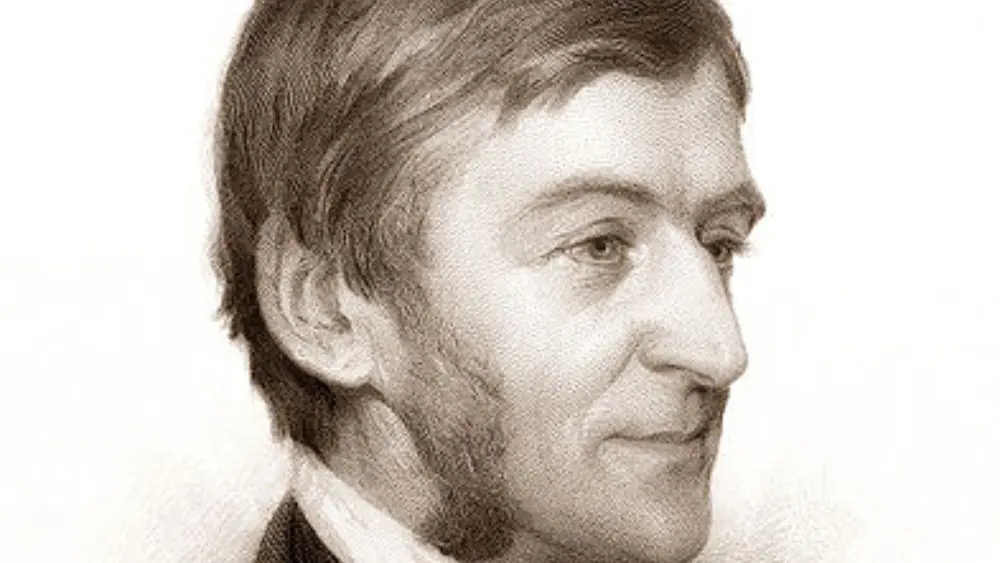Ralph Waldo Emerson, born on May 25, 1803, in Boston, Massachusetts, was a prominent American essayist, lecturer, and philosopher. His influence on American thought and literature during the 19th century is immeasurable, and he is widely regarded as a central figure in the transcendentalist movement, contributing significantly to the development of American intellectual and literary traditions.
Early Life and Education
Ralph Waldo Emerson’s early life was shaped by adversity, having lost his father at a young age. The financial difficulties that followed did not deter him from pursuing his education with unwavering determination. Emerson’s intellectual journey began at Harvard College, a pivotal period that laid the foundation for his future endeavors. At Harvard, he immersed himself in a rich academic environment, kindling a lifelong love for learning and intellectual exploration that would become hallmarks of his philosophical and literary contributions.
Harvard played a crucial role in shaping Emerson’s intellectual identity, exposing him to a diverse range of ideas and perspectives. His time at the university set the stage for the transcendentalist philosophy that would define his work and influence American thought. Emerson’s resilience in the face of personal challenges and his commitment to education reflect the foundational principles that would guide his philosophical reflections and establish him as a prominent figure in American literature and philosophy.
Ralph Waldo Emerson: Essays and Lectures
Ralph Waldo Emerson’s impact on American literature and thought is most prominently manifested in his essays and lectures. These works are not only enduring pieces of literature but also foundational texts that have significantly influenced the trajectory of American intellectual history. Among his most celebrated essays is “Self-Reliance,” where Emerson expounds on the virtues of individualism and self-trust, encouraging readers to rely on their own intuition and beliefs. In “Nature,” he delves into the interconnectedness of humanity and the natural world, emphasizing the spiritual significance of nature in human experience. Another pivotal work, “The American Scholar,” challenges traditional notions of education and calls for a more self-reliant and intellectually independent approach to learning.
Emerson’s essays and lectures collectively form a body of work that reflects his transcendentalist philosophy, advocating for individual intuition, nonconformity, and a spiritual connection to nature. These writings have left an indelible mark on American literature and intellectual thought, inspiring generations of readers to embrace a more profound understanding of the self and the world around them.
Transcendentalism and Individualism
Ralph Waldo Emerson’s profound influence on the transcendentalist movement solidified his status as a key figure in this philosophical and literary wave of thought. Transcendentalism, emerging in the early to mid-19th century in the United States, was characterized by a belief in the inherent goodness of both individuals and nature, rejecting the prevailing pessimistic views of human nature. Emerson’s essays, particularly “Self-Reliance” and “Nature,” encapsulate the core tenets of transcendentalism.
At the heart of transcendentalist philosophy was a profound emphasis on individualism, a theme central to Emerson’s works. He championed the idea that every person possesses an innate divinity and an intuitive connection to a higher spiritual reality. Encouraging self-reliance, Emerson urged individuals to trust their own instincts and beliefs rather than conforming to societal expectations. Through these transcendentalist principles, Emerson and his contemporaries sought to inspire a deeper understanding of the self, promoting a sense of empowerment and spiritual connection to the natural world.
Ralph Waldo Emerson: Transcendentalist Philosophy
Ralph Waldo Emerson’s transcendentalist philosophy represented a significant departure from the traditional religious and societal norms of his time. Central to his worldview was the concept of the Oversoul, an idea that posited a universal spirit connecting all living entities. This belief reflected Emerson’s rejection of organized religion, advocating instead for a more individualized and direct spiritual experience.
By championing the Oversoul, Emerson emphasized the interconnectedness of humanity and the natural world, promoting a holistic understanding of existence. This transcendentalist perspective encouraged individuals to seek a deeper, personal connection to the divine, free from the constraints of established religious dogma. Emerson’s philosophy became a foundational element of the transcendentalist movement, influencing a generation of thinkers who sought a more intuitive, self-reliant, and spiritually attuned approach to life.
Literary Influence and Friendship with Thoreau
Ralph Waldo Emerson’s impact on American literature and philosophy went beyond his own writings through his influential connections and friendships. One of the most notable associations in his life was with Henry David Thoreau, a fellow transcendentalist and a close friend. Thoreau, deeply influenced by Emerson’s philosophy of individualism, nature, and self-reliance, incorporated these principles into his own life and work.
The friendship between Emerson and Thoreau was characterized by a shared commitment to transcendentalist ideals. Thoreau’s renowned work, “Walden,” is a testament to the influence of Emerson’s ideas, as it explores themes of simplicity, harmony with nature, and a deliberate, intentional way of living. The camaraderie between these two thinkers not only enriched their personal lives but also fostered a collaborative synergy that contributed significantly to the transcendentalist movement. Moreover, their intellectual partnership left an enduring legacy in American literature and philosophy, shaping the trajectory of thought for generations to come. Furthermore, this shared commitment to transcendental ideals not only deepened their connection but also solidified their impact on the cultural and intellectual currents of their time.
Ralph Waldo Emerson: Individualism and Nonconformity
Ralph Waldo Emerson’s philosophy of individualism and nonconformity stands as a cornerstone of American thought and identity. Emerson’s writings, particularly in essays like “Self-Reliance,” emphasized the importance of trusting one’s own instincts and beliefs, championing the idea that individuals possess an innate wisdom that should guide their actions. This celebration of individualism resonated deeply with the American spirit of self-determination and autonomy.
Emerson’s call for nonconformity was a radical departure from the prevailing societal norms of his time. He urged individuals to resist conformity to established institutions and traditions, promoting the idea that true greatness lies in the ability to forge one’s path and express one’s unique perspective. This emphasis on individualism and nonconformity not only became a driving force in American literature but also contributed significantly to shaping the broader cultural landscape. Consequently, it fostered a spirit of independence that endures in the American consciousness. Moreover, this enduring influence extends beyond literature, permeating various facets of society.
Later Life and Continued Influence
In the later years of his life, Ralph Waldo Emerson remained an influential figure, continuing to lecture and write on a wide array of topics. His commitment to social issues was evident in his anti-slavery activism, reflecting a desire to contribute to the pressing matters of his time. Emerson’s philosophical exploration extended to the study of history, where he delved into the intricacies of how societies evolve and the lessons that can be gleaned from the past.
Emerson’s impact didn’t wane with age; rather, it extended to subsequent generations of thinkers. One notable individual influenced by Emerson’s ideas was Walt Whitman, the acclaimed American poet. Whitman drew inspiration from Emerson’s transcendentalist philosophy, incorporating elements of individualism, nature, and a spiritual connection with the universe into his own poetic works. Emerson’s legacy, therefore, not only endured in his own writings but also found resonance in the creative expressions of those who followed. Furthermore, it solidified his lasting influence on American literature and thought. As a result, his profound impact is evident not just in his contemporaries’ works but also in the subsequent generations of writers who embraced and expanded upon his ideas.

Ralph Waldo Emerson: Legacy and Enduring Influence
Emerson’s legacy is profound and has left an indelible mark on American culture. His emphasis on individualism, self-reliance, and the transcendental connection between humanity and nature resonates strongly in the fabric of American thought. Emerson’s writings have become timeless touchstones, influencing not only literature but also philosophy and the broader cultural landscape. The notion that individuals possess an innate wisdom and can forge their own path, free from societal constraints, continues to inspire generations seeking personal and intellectual freedom.
The enduring influence of Emerson’s ideas is evident in the ongoing relevance of his works in contemporary discussions about identity, creativity, and the relationship between individuals and society. As America continues to grapple with questions of individual agency and the role of the individual in a collective context, Emerson’s legacy persists as a source of inspiration, challenging and encouraging individuals to explore their unique paths and contribute to the ever-evolving narrative of the American experience.




